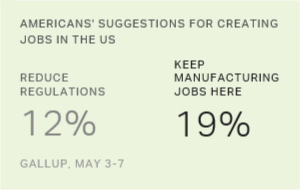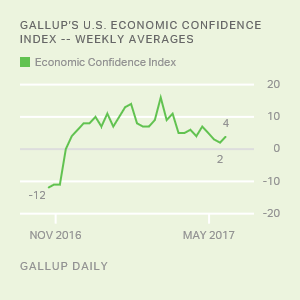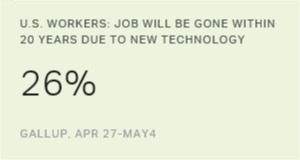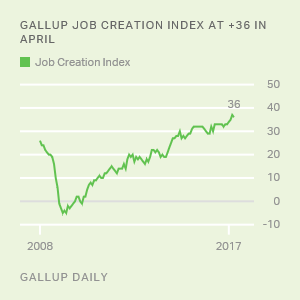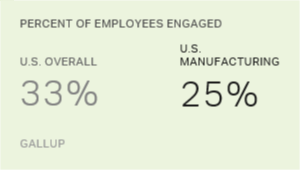Story Highlights
- 19% say keeping manufacturing jobs in U.S. is best way to create jobs
- Mentions of education are up significantly from 2009 and 2011
- "Lowering taxes" and "improving education" are most divisive suggestions
WASHINGTON, D.C. -- "Keeping manufacturing jobs from going overseas" is the top recommendation Americans give as the best way to create more jobs in the U.S. Many also suggest reducing government regulation, lowering taxes, creating more infrastructure work and improving education.
| Nov 20-22, 2009 | Mar 25-27, 2011 | May 3-7, 2017 | ||||||||||||||||||||||||||||||||||||||||||||||||||||||||||||||||||||||||||||||||||||||||||||||||||
|---|---|---|---|---|---|---|---|---|---|---|---|---|---|---|---|---|---|---|---|---|---|---|---|---|---|---|---|---|---|---|---|---|---|---|---|---|---|---|---|---|---|---|---|---|---|---|---|---|---|---|---|---|---|---|---|---|---|---|---|---|---|---|---|---|---|---|---|---|---|---|---|---|---|---|---|---|---|---|---|---|---|---|---|---|---|---|---|---|---|---|---|---|---|---|---|---|---|---|---|---|
| % | % | % | ||||||||||||||||||||||||||||||||||||||||||||||||||||||||||||||||||||||||||||||||||||||||||||||||||
| Corporate actions | ||||||||||||||||||||||||||||||||||||||||||||||||||||||||||||||||||||||||||||||||||||||||||||||||||||
| Keep manufacturing jobs here/Stop sending overseas | 18 | 25 | 19 | |||||||||||||||||||||||||||||||||||||||||||||||||||||||||||||||||||||||||||||||||||||||||||||||||
| Hire more U.S. citizens/Stop hiring illegal aliens | 3 | 5 | 3 | |||||||||||||||||||||||||||||||||||||||||||||||||||||||||||||||||||||||||||||||||||||||||||||||||
| Government actions | ||||||||||||||||||||||||||||||||||||||||||||||||||||||||||||||||||||||||||||||||||||||||||||||||||||
| Reduce government regulation/involvement | 7 | 10 | 12 | |||||||||||||||||||||||||||||||||||||||||||||||||||||||||||||||||||||||||||||||||||||||||||||||||
| Lower taxes | 14 | 12 | 12 | |||||||||||||||||||||||||||||||||||||||||||||||||||||||||||||||||||||||||||||||||||||||||||||||||
| Create more infrastructure work | 10 | 13 | 10 | |||||||||||||||||||||||||||||||||||||||||||||||||||||||||||||||||||||||||||||||||||||||||||||||||
| Do more to help small businesses | 12 | 11 | 6 | |||||||||||||||||||||||||||||||||||||||||||||||||||||||||||||||||||||||||||||||||||||||||||||||||
| Higher taxes on imports/Buy American | 4 | 6 | 3 | |||||||||||||||||||||||||||||||||||||||||||||||||||||||||||||||||||||||||||||||||||||||||||||||||
| Stop welfare/Give fewer handouts | 0 | 1 | 2 | |||||||||||||||||||||||||||||||||||||||||||||||||||||||||||||||||||||||||||||||||||||||||||||||||
| Cut government spending/Reduce the deficit | 3 | 5 | 1 | |||||||||||||||||||||||||||||||||||||||||||||||||||||||||||||||||||||||||||||||||||||||||||||||||
| Government and corporate actions | ||||||||||||||||||||||||||||||||||||||||||||||||||||||||||||||||||||||||||||||||||||||||||||||||||||
| Higher wages for the middle class | 0 | 2 | 4 | |||||||||||||||||||||||||||||||||||||||||||||||||||||||||||||||||||||||||||||||||||||||||||||||||
| Create more "green" jobs | 6 | 3 | 2 | |||||||||||||||||||||||||||||||||||||||||||||||||||||||||||||||||||||||||||||||||||||||||||||||||
| Education | ||||||||||||||||||||||||||||||||||||||||||||||||||||||||||||||||||||||||||||||||||||||||||||||||||||
| Improve education | 3 | 4 | 10 | |||||||||||||||||||||||||||||||||||||||||||||||||||||||||||||||||||||||||||||||||||||||||||||||||
| General | ||||||||||||||||||||||||||||||||||||||||||||||||||||||||||||||||||||||||||||||||||||||||||||||||||||
| Improve the economy overall | 1 | 2 | 1 | |||||||||||||||||||||||||||||||||||||||||||||||||||||||||||||||||||||||||||||||||||||||||||||||||
| Other | 9 | 2 | 4 | |||||||||||||||||||||||||||||||||||||||||||||||||||||||||||||||||||||||||||||||||||||||||||||||||
| No reason in particular | 4 | 3 | 4 | |||||||||||||||||||||||||||||||||||||||||||||||||||||||||||||||||||||||||||||||||||||||||||||||||
| No opinion | 16 | 14 | 17 | |||||||||||||||||||||||||||||||||||||||||||||||||||||||||||||||||||||||||||||||||||||||||||||||||
| Gallup | ||||||||||||||||||||||||||||||||||||||||||||||||||||||||||||||||||||||||||||||||||||||||||||||||||||
These responses, from a May 3-7 Gallup poll, are generally similar to what Gallup found when it asked this open-ended question in 2009 and 2011 -- except education, which is mentioned more frequently this year than in the past.
Although Donald Trump stressed retaining and restoring manufacturing jobs in the U.S. while he was a presidential candidate, the idea is not new for Americans. Retaining and restoring manufacturing jobs also topped Americans' recommendation list in 2009 and 2011.
The suggestions to lower taxes and create more infrastructure work were also among the top ideas in the previous two polls. However, Americans today are somewhat more likely to mention reducing government regulation as the best way to create jobs (12%) than they were in 2009 (7%), the year President Barack Obama and a Democratic-led Congress passed a number of new regulations in response to the financial crisis.
Also, substantially more Americans say improving education is the best way to create jobs now than said this in 2009, 10% versus 3%. Recent Gallup research shows that a significant segment of workers today are worried about their jobs being eliminated by technology, artificial intelligence, automation or robots in the future. Additionally, much of the highly publicized growth in jobs in recent decades has come from technology entrepreneurs harnessing computers, software and high tech. Both developments underscore the potential of education to create new jobs.
During the 2016 presidential campaign, Americans generally perceived Trump as a strong candidate in the area of job creation. That may have resulted partly from Trump's emphasis on jobs as a major theme of his campaign but also, as these findings show, several of the job-generating policies Trump promoted were ones that a sizable portion of the public judged to be effective.
The majority of the ideas Americans offer as ways to create jobs would require government action. In addition to lowering taxes, spending on infrastructure and reducing regulation, these include helping small businesses, placing higher taxes on imports and reducing welfare.
Other suggestions would be more likely to require action in the corporate arena -- including boosting middle-class wages and creating more "green jobs."
Republicans More Likely to Suggest Lowering Taxes; Democrats, Improving Education
Consistent with their general belief that their taxes are too high, Republicans and Republican-leaning independents are more likely than Democrats and Democratic leaners to say the best way to create jobs in the U.S. is to lower taxes, 22% to 2%. Republicans also more commonly mention cutting back on government regulation than do Democrats.
Democrats (15%) are more likely than Republicans (5%) to suggest improving education. Most of the increase in mentions of education since 2009 is attributable to Democrats. That year, 5% of Democrats and 1% of Republicans said the best way to create jobs was to improve education.
Substantial percentages of Republicans (24%) and Democrats (16%) say the best way to create jobs in the U.S. is to keep manufacturing jobs in the country. This partisan split represents a break from 2011, when 23% of Republicans and 25% of Democrats provided this answer. And in 2009, Democrats edged out Republicans in offering this response, 20% to 16%.
But while Republicans' second-most-frequently mentioned suggestion is lowering taxes, followed by reducing government regulations, Democrats' second and third suggestions are improving education and increasing spending on infrastructure.
| Republicans/GOP leaners | Democrats/Democratic leaners | Net difference | ||||||||||||||||||||||||||||||||||||||||||||||||||||||||||||||||||||||||||||||||||||||||||||||||||
|---|---|---|---|---|---|---|---|---|---|---|---|---|---|---|---|---|---|---|---|---|---|---|---|---|---|---|---|---|---|---|---|---|---|---|---|---|---|---|---|---|---|---|---|---|---|---|---|---|---|---|---|---|---|---|---|---|---|---|---|---|---|---|---|---|---|---|---|---|---|---|---|---|---|---|---|---|---|---|---|---|---|---|---|---|---|---|---|---|---|---|---|---|---|---|---|---|---|---|---|---|
| % | % | pct. pts. | ||||||||||||||||||||||||||||||||||||||||||||||||||||||||||||||||||||||||||||||||||||||||||||||||||
| Corporate actions | ||||||||||||||||||||||||||||||||||||||||||||||||||||||||||||||||||||||||||||||||||||||||||||||||||||
| Keep manufacturing jobs here/Stop sending overseas | 24 | 16 | 8 | |||||||||||||||||||||||||||||||||||||||||||||||||||||||||||||||||||||||||||||||||||||||||||||||||
| Hire more U.S. citizens/Stop hiring illegal aliens | 4 | 2 | 2 | |||||||||||||||||||||||||||||||||||||||||||||||||||||||||||||||||||||||||||||||||||||||||||||||||
| Government actions | ||||||||||||||||||||||||||||||||||||||||||||||||||||||||||||||||||||||||||||||||||||||||||||||||||||
| Reduce government regulation/involvement | 17 | 6 | 11 | |||||||||||||||||||||||||||||||||||||||||||||||||||||||||||||||||||||||||||||||||||||||||||||||||
| Lower taxes | 22 | 2 | 20 | |||||||||||||||||||||||||||||||||||||||||||||||||||||||||||||||||||||||||||||||||||||||||||||||||
| Create more infrastructure work | 6 | 13 | -7 | |||||||||||||||||||||||||||||||||||||||||||||||||||||||||||||||||||||||||||||||||||||||||||||||||
| Do more to help small businesses | 7 | 6 | 1 | |||||||||||||||||||||||||||||||||||||||||||||||||||||||||||||||||||||||||||||||||||||||||||||||||
| Higher taxes on imports/Buy American | 5 | 1 | 4 | |||||||||||||||||||||||||||||||||||||||||||||||||||||||||||||||||||||||||||||||||||||||||||||||||
| Stop welfare/Give fewer handouts | 2 | 1 | 1 | |||||||||||||||||||||||||||||||||||||||||||||||||||||||||||||||||||||||||||||||||||||||||||||||||
| Cut government spending/Reduce the deficit | 1 | 1 | 0 | |||||||||||||||||||||||||||||||||||||||||||||||||||||||||||||||||||||||||||||||||||||||||||||||||
| Government and corporate actions | ||||||||||||||||||||||||||||||||||||||||||||||||||||||||||||||||||||||||||||||||||||||||||||||||||||
| Higher wages for the middle class | 1 | 6 | -5 | |||||||||||||||||||||||||||||||||||||||||||||||||||||||||||||||||||||||||||||||||||||||||||||||||
| Create more "green" jobs | 0 | 4 | -4 | |||||||||||||||||||||||||||||||||||||||||||||||||||||||||||||||||||||||||||||||||||||||||||||||||
| Education | ||||||||||||||||||||||||||||||||||||||||||||||||||||||||||||||||||||||||||||||||||||||||||||||||||||
| Improve education | 5 | 15 | -10 | |||||||||||||||||||||||||||||||||||||||||||||||||||||||||||||||||||||||||||||||||||||||||||||||||
| General | ||||||||||||||||||||||||||||||||||||||||||||||||||||||||||||||||||||||||||||||||||||||||||||||||||||
| Improve the economy overall | 2 | 1 | 1 | |||||||||||||||||||||||||||||||||||||||||||||||||||||||||||||||||||||||||||||||||||||||||||||||||
| Other | 3 | 4 | -1 | |||||||||||||||||||||||||||||||||||||||||||||||||||||||||||||||||||||||||||||||||||||||||||||||||
| Gallup, May 3-7, 2017 | ||||||||||||||||||||||||||||||||||||||||||||||||||||||||||||||||||||||||||||||||||||||||||||||||||||
Bottom Line
As was the case in 2009 and 2011, keeping manufacturing jobs from leaving the country is Americans' single-most-popular approach for creating (or, in some instances, retaining) U.S. jobs. The idea clearly predates Trump's presidential campaign but gives some insight into why his message resonated with many voters.
Many economists and policy professionals express skepticism that the number of manufacturing jobs can expand significantly in the U.S. Some reasons that a substantial expansion of manufacturing jobs in the U.S. is unlikely include the difference between U.S. and overseas labor rates, the vast manufacturing infrastructure already in place overseas, and the growing use of robots and technology in place of workers at many manufacturing plants, wherever they are. Trump hopes to prove these prognosticators wrong.
Trump is also attempting to follow through on other suggestions that the American public frequently offers -- including reduced government regulation, lowering taxes and more spending on infrastructure.
These data are available in Gallup Analytics.
Survey Methods
Results for this Gallup poll are based on telephone interviews conducted May 3-7, 2017, with a random sample of 1,011 adults, aged 18 and older, living in all 50 U.S. states and the District of Columbia. For results based on the total sample of national adults, the margin of sampling error is ±4 percentage points at the 95% confidence level. All reported margins of sampling error include computed design effects for weighting.
Each sample of national adults includes a minimum quota of 70% cellphone respondents and 30% landline respondents, with additional minimum quotas by time zone within region. Landline and cellular telephone numbers are selected using random-digit-dial methods.
View survey methodology, complete question responses and trends.
Learn more about how the Gallup Poll Social Series works.
